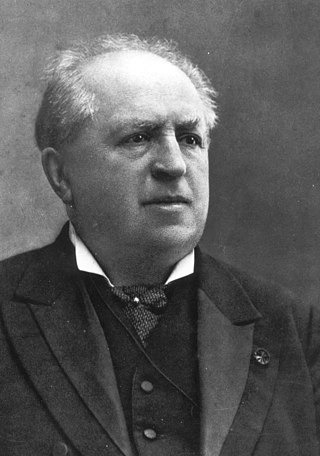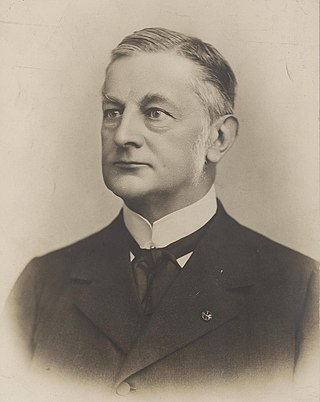| Part of the Politics series |
 |
|---|
| |
The Free Anti Revolutionary Party (Dutch : Vrij-Antirevolutionaire Partij, VAR) was a Dutch conservative Reformed political party, which existed from 1898 to 1903.
| Part of the Politics series |
 |
|---|
| |
The Free Anti Revolutionary Party (Dutch : Vrij-Antirevolutionaire Partij, VAR) was a Dutch conservative Reformed political party, which existed from 1898 to 1903.
The VAR was founded as one of several parties that were founded in the 1890s, which all turned against the leadership and ideology of Abraham Kuyper, the leader of the Protestant Anti Revolutionary Party. Kuyper had initiated a new political course for Protestantism in the Netherlands, which included cooperation with the Catholics, in the coalition, strategical support for extension of suffrage a rejection of theocracy in favour of a specific conception of state neutrality, sphere sovereignty and a strong party organization and party discipline. The opposition against Kuyper was led by Alexander de Savorin Lohman.
The elections of 1894 proved decisive. An important issue in the election was the extension of suffrage proposed by the Minister of the Interior Johannes Tak van Poortvliet. After the election two anti-revolutionary parliamentary parties were formed one, led by Kuyper favoured the suffrage which was backed by the ARP, while the other led by De Savorin Lohman rejected it. With De Savorin Lohman many aristocrats and noblemen left the ARP, as did adherents of the Dutch Reformed Church, as opposed to the Reformed Churches in the Netherlands, which was founded by Kuyper himself. The group around De Savorin Lohman sought to found a new party. In 1896, they set up a commission to found a new party. In September 1898 the Free Anti Revolutionary Party was founded. [1]
In the 1901 elections, the party won nine seats, four more than the five the free Anti Revolutionaries had won as individual candidates in 1897. The religious parties won a majority in this election, a cabinet was formed by ARP leader Kuyper, which the VAR supported without providing any ministers.
In 1903, the VAR merged with the Christian Historical Voters' League to form the Christian Historical Party.
The term anti-revolutionary was used to denote supporters of the main Protestant party, the Anti Revolutionary Party, which denounced the French Revolution. The dissenters against the organizational and political course of the ARP called themselves free antirevolutionaries, implying that they upheld the Anti Revolutionary beliefs without being a member of the strong party organisation.
The VAR was a conservative Protestant party. It saw government as a God-given institution, which should act according to Biblical norms. Society should furthermore follow its historical course. Power should not be based on the opinion of the majority but on authority.
The VAR was formed as a result of dissent within the main Protestant party the Anti Revolutionary Party. Unlike that party the VAR did not recognize Catholicism as a legitimate religion. The party was strongly anti-papist. According to the VAR the Netherlands was a Protestant nation. As such it was hostile to the Roman Catholic segment of society. It renounced the coalition between the Protestant Anti Revolutionary Party and the Catholic General League and more generally it rejected the antithesis between religious and non-religious parties. Catholic influences within society should be limited.
The VAR advocated limited government. It supported only limited government interference in the economy and instead advocated charity to help the poor. Furthermore, the party opposed general suffrage.
This table shows the VAR's results in elections to the House of Representatives and Senate, as well as the party's political leadership: the fractievoorzitter. It also possible that the party leader is member of cabinet, if the VAR was part of the governing coalition, the "highest ranking" minister is listed.
| Year | HoR | S | Lijsttrekker | Cabinet |
|---|---|---|---|---|
| 1897 | 5 | 3 | Alexander de Savornin Lohman | opposition |
| 1898 | 5 | 3 | Alexander de Savornin Lohman | opposition |
| 1899 | 5 | 3 | Alexander de Savornin Lohman | opposition |
| 1900 | 5 | 2 | Alexander de Savornin Lohman | opposition |
| 1901 | 9 | 2 | Alexander de Savornin Lohman | supports the cabinet of Kuyper |
| 1902 | 9 | 3 | Alexander de Savornin Lohman | supports the cabinet of Kuyper |
The electorate of the VAR was mainly constituted by adherents of the Dutch Reformed Church from the upper class, especially nobility, land owners, high officers and high-ranking civil servants. It won and kept seats in several districts with large reformed populations, Goes in Zeeland, Apeldoorn in Gelderland, Dokkum in Friesland and Katwijk and Schiedam in South Holland.

The Reformed Political Party is a conservative Reformed Christian political party in the Netherlands. The SGP is the oldest political party in the Netherlands existing in its present form, and has been in opposition for its entire existence. Since 1925, it has won between 1.5% and 2.5% of the votes in general elections. Owing to its orthodox political ideals and its traditional role in the opposition, the party is considered a testimonial party.

The Anti-Revolutionary Party was a Protestant conservative and Christian democratic political party in the Netherlands. The party was founded in 1879 by Abraham Kuyper, a neo-Calvinist theologian and minister who served as Prime Minister between 1901 and 1905. In 1980 the party merged with the Catholic People's Party (KVP) and the Christian Historical Union (CHU) to form the Christian Democratic Appeal (CDA).

Abraham Kuyper was the Prime Minister of the Netherlands between 1901 and 1905, an influential neo-Calvinist pastor and a journalist. He established the Reformed Churches in the Netherlands, which upon its foundation became the second largest Reformed denomination in the country behind the state-supported Dutch Reformed Church.

The Catholic People's Party was a Catholic Christian democratic political party in the Netherlands. The party was founded in 1945 as a continuation of the interwar Roman Catholic State Party, which was in turn a successor of the General League of Roman Catholic Caucuses. The party was in government throughout its existence. In 1977, a federation of parties including the Catholic People's Party, the Anti-Revolutionary Party (ARP) and the Christian Historical Union (CHU) ran together under the Christian Democratic Appeal (CDA) banner. The three participating parties formally dissolved to form the CDA in 1980.

The Christian Historical Union was a Protestant Christian democratic political party in the Netherlands. The CHU is one of the predecessors of the Christian Democratic Appeal (CDA), into which it merged in September 1980.

The Reformatory Political Federation was a minor Protestant Christian political party in the Netherlands.

The General League of Roman Catholic Electoral Associations, informally called the General League, was a Catholic political party in the Netherlands. It existed from 1904 to 1926, when it was succeeded by the Roman Catholic State Party. It is one of the ancestors of today's Christian Democratic Appeal.
In neo-Calvinism, sphere sovereignty, also known as differentiated responsibility, is the concept that each sphere of life has its own distinct responsibilities and authority or competence, and stands equal to other spheres of life. Sphere sovereignty involves the idea of an all encompassing created order, designed and governed by God. This created order includes societal communities, their historical development, and their abiding norms. The principle of sphere sovereignty seeks to affirm and respect creational boundaries, and historical differentiation.

The Christian Historical Voters' League was a conservative protestant political party in the Netherlands.

The League of electoral associations on Christian Historical foundation in the province of Friesland, informally called the Frisian League is a conservative Reformed political party in the Netherlands. The Frisian League is historically linked to the Christian Democratic Appeal, which is currently one of the major parties of the Netherlands.

The Christian Historical Party was a conservative Reformed political party in the Netherlands which existed from 1903 to 1908.

The Christian Democratic Party was a Dutch left-wing Christian-democratic political party. The CDP played only a minor role in parliament. It is historically linked to both the Labour Party and the Christian Democratic Appeal.

This article gives an overview of Christian democracy in the Netherlands, which is also called confessionalism, including political Catholicism and Protestantism.
The school struggle is a historical conflict in the Netherlands between 1848 and 1917 over the equalization of public financing for religious schools.

Jhr. Alexander Frederik de Savornin Lohman was a Dutch politician and leader of the Christian Historical Union during the first quarter of the 20th century.
Pillarisation is the vertical separation of citizens into groups by religion and associated political beliefs. These societies were divided into two or more groups known as pillars. The best-known examples of this have historically occurred in the Netherlands and Belgium.

The Reformed Political League was an orthodox Protestant political party in the Netherlands. The GPV is one of the predecessors of the Christian Union. The party was a testimonial party.

A process of cabinet formation took place following the Dutch general election of 14 and 27 June 1901. The formation resulted in the Kuyper cabinet on 1 August 1901. It was the second coalition cabinet, because it consisted of Catholics and the Anti-Revolutionary Party (ARP). It was further supported by the Free Anti-Revolutionary Party (VAR) and the Christian Historical Voters' League (CHK).
A process of cabinet formation took place in the Netherlands after the De Meester cabinet offered its resignation on 24 December 1907. The formation resulted in the Theo Heemskerk cabinet on 12 February 1908. It was the third coalition cabinet, because it consisted of the Catholics, the Anti-Revolutionary Party (ARP) and supported by the Christian Historical Union (CHU).
A process of cabinet formation took place following the Dutch general election of 6 and 20 March 1888. The formation resulted in the Mackay cabinet on 21 April 1888. It was the first coalition cabinet, because it consisted of Catholics and the Anti-Revolutionary Party (ARP).